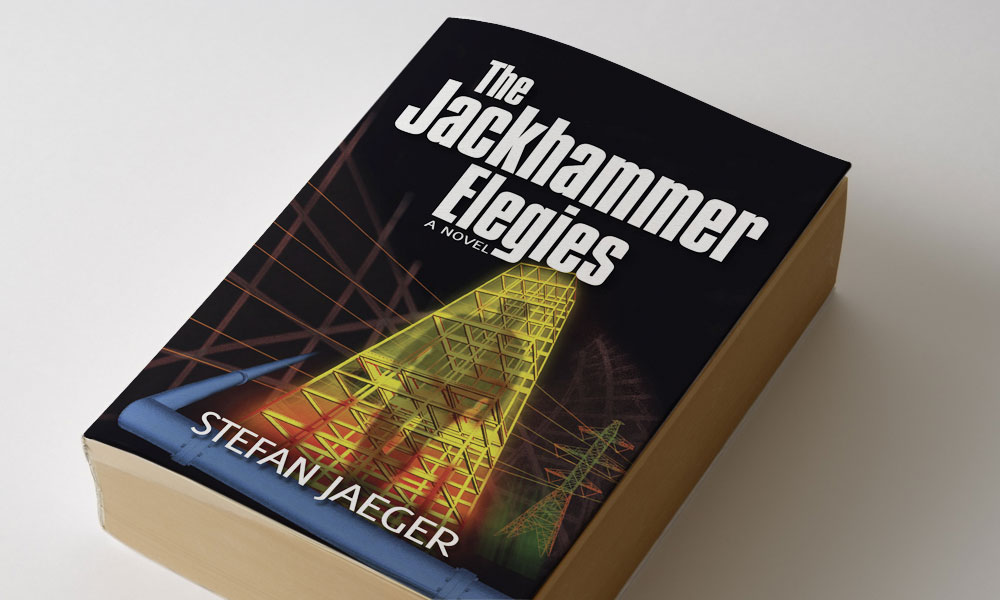
A Novel Approach to Promote an Industry
Novelist and managing director of the American Society of Civil Engineers Stefan Jaeger’s new book The Jackhammer Elegies delves into the world of engineering—a profession not often portrayed in popular culture.
When’s the last time you saw a TV show about civil engineers? Or a movie in which an electrical engineer saves the world? Maybe never?
Engineers, unfortunately, are not your typical heroes or protagonists in popular culture. But that doesn’t make them any less interesting than the doctors or lawyers who are often portrayed in primetime TV or in John Grisham novels.
And while not the sole motivation for writing his latest novel, The Jackhammer Elegies, promoting an often-ignored industry did not skip writer and association executive Stefan Jaeger’s mind either.
People should be attracted to the profession, but if they don’t hear about it or know what engineers do, that becomes a problem.
“It’s a great profession,” Jaeger said of engineering. “People should be attracted to the profession, but if they don’t hear about it or know what engineers do, that becomes a problem.”
It’s also an industry Jaeger happens to know a lot about, having spent the last almost 30 years working at engineering associations, including most recently at the American Society of Civil Engineers, where he is managing director.
“You work for an industry so long and you become one with their issues, you become sympathetic to their issues, and you sort of want to give back,” Jaeger said. “The issues of the people I’ve worked with for so long are worth promoting. It was definitely a conscious effort to get some of that out there.”
In the book, which Jaeger self-published in May 2012, civil and structural engineer Scott Carter teams up with FBI Special Agent Michelle Taylor to provide engineering expertise on a case involving a terrorist—the Jackhammer—targeting a city’s public works.
Jaeger said none of the characters in the book were inspired by any particular people, but some of the frustrations, especially those of the villain, were based on real-life frustrations of engineers.
“Engineers can get upset about the fact that people don’t really know what engineering is or what’s involved, or they sort of feel slighted when someone calls an engineer to come fix a door,” Jaeger said. “Those kinds of frustrations get woven into the book. Certainly I’ve heard engineer readers say they can relate to the issues that come up.”
Based on Amazon reviews, the novel is definitely striking a chord with engineers who are enjoying the opportunity to read a thriller about their own industry:
“I think that Jackhammer Elegies will give the general public a much better appreciation of civil engineering, and about the additional constraints that being licensed places upon a practicing engineer. For that, I am personally grateful, as I think every professional engineer will be upon reading the book.”
–Bernard Berson
“Popular culture revels in doctor and lawyer dramas, so it was heartening to see an engineer be the protagonist (and antagonist) in a thrilling book that rivals similar mystery novels.” –epollitzer, PE
“I have been a fan of Clancy and Ludlum for quite a while. Stefan Jaeger’s Jackhammer Elegies had the plot twists and exciting elements of those authors while adding an engineering element that felt authentic. Most thrillers blow things up at some point—it was fascinating to look at this from the more realistic viewpoint of ‘What does it take to bring this structure down?’ Weaving that kind of realism into the plot of the story made this more than just another thriller.” –KC
Jaeger, who recently won a 2013 SET award [PDF] from the Entertainment Industries Council for his work promoting engineering in the novel, also alludes to the value of associations. The novel’s hero, Scott Carter, is an active member of ASCE.
“ASCE has certain strategic issues—the state of the nation’s infrastructure not being what it should be, a need for greater investment and sustainability, and raising the bar for the educational requirements for licensure—those are things that aren’t dwelled on in detail in the book, but they’re things on the side that [Carter] thinks about here and there,” Jaeger said.
Promoting membership in the association wasn’t the goal, Jaeger said. “But I did toy with the thought that if the book ended up getting a lot of play among civil engineers, then the positive image of the main character might reflect toward the positive image of ASCE, since the protagonist is an active ASCE member.”
If you wrote a novel about your association’s industry, what would the plot be? Let us know in the comments.
(iStock/Thinkstock; press photo)






Comments